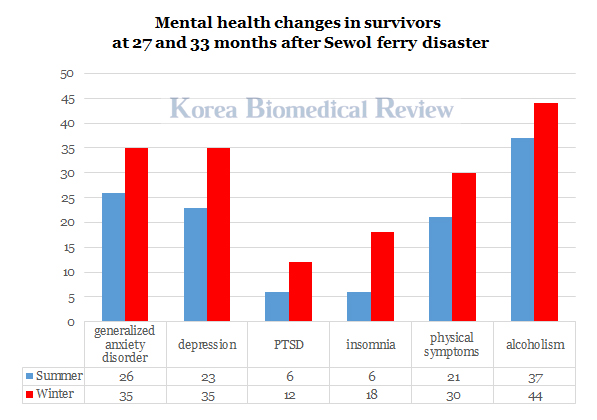The survivors of the Sewol ferry disaster and the bereaved family members of its victims are still suffering from a sharply degraded quality of life because of post-traumatic stress disorder, experts said Thursday.
The Sewol ferry, which sank off the coast of Jindo Island on April 16, 2014, killed 250 students from Danwon High School and 54 others, resulting in one of the most tragic incidents in recent Korean history. The ferry was salvaged on Sunday, nearly three years after it sank.
At the Korean Neuropsychiatric Association’s spring conference, Dr. Lee So-hee from National Medical Center presented new statistics on the mental health of Sewol survivors.
A poll taken of 57 Danwon survivors 20 months after the disaster found 44 percent of the surveyed ranked below the 16 percentile regarding psychological well-being, peer and social support, and autonomy. The questionnaire indicated that Sewol survivors suffered in comparison to peers in their age group by ranking as much as 20 percent lower.
Lee’s findings also showed that 48 survivors (24 males and 24 females) scored significantly higher on factors of generalized anxiety disorder, depression, PTSD, insomnia, physical symptoms, and alcoholism. The 48 former Danwon students completed the survey 27 months and 33 months, respectively, after the ferry sank.

Another analysis found significantly higher odds ratios in depression, stress, physical systems, anxiety, and suicidal ideation among the citizens of Ansan, where Danwon High School is located, compared with those of other areas in Gyeonggi Province.
Commenting on the parents of the deceased, Professor Lee Kang-wook of Gangwon National University, who has treated the bereaved as a physiatrist, said they too have struggled to regain footing in their daily lives.
Parents of the deceased now deal with life without their children, finding solace in one another, and in collecting memorabilia related to the calamity, such as yellow-ribbon necklaces, bracelets, keychains, and pins, he said. To alleviate their pain, parents of the victims have held regular meetings, played rehearsals, poetry recitals, soccer games, and even demonstrations to ease their suffering. All had their limitations, though, he added.
“Three years have passed, but parents still find it hard to return to a healthy life. They cite reasons such as alcoholism, obsessive investigating, and trouble adjusting to work,” Professor Lee said. “It’s vital that they find something of meaning, unrelated to the ferry disaster. They should move forward.”
Lee stressed that the government and community need to monitor the mental health of these students, continually and persistently, and provide support from all angles. “Professional and government assistance is of the essence,” he said.

